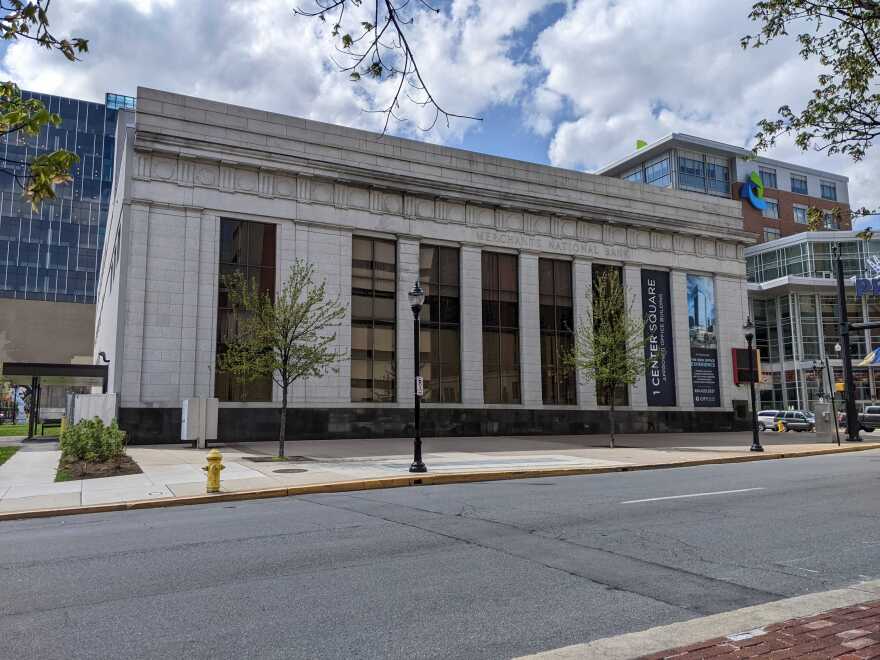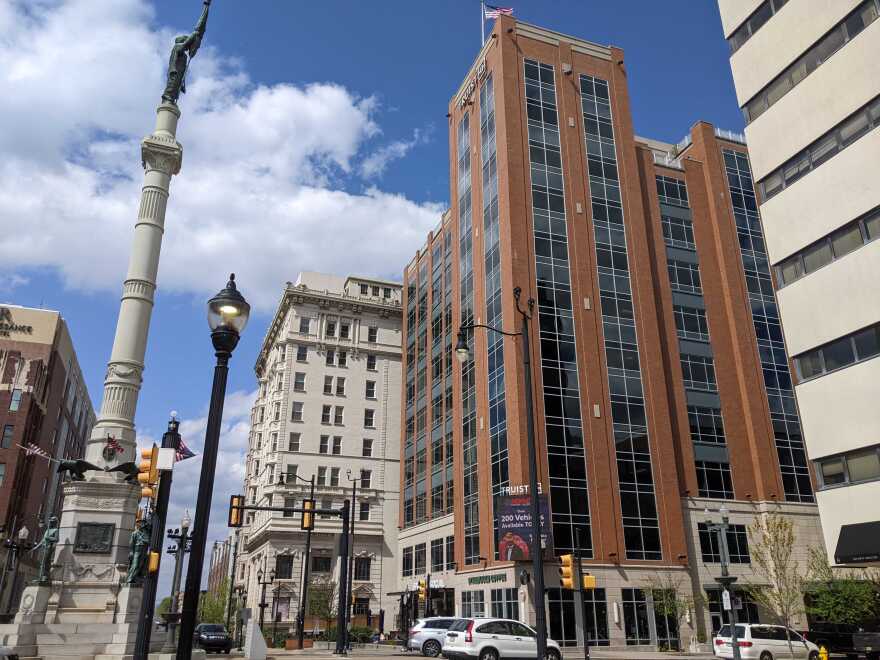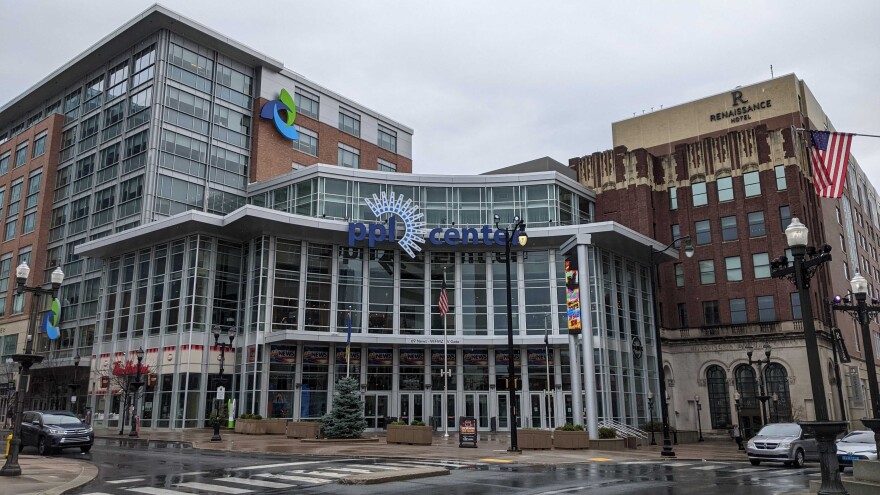ALLENTOWN, Pa. — Businesses in the city's Neighborhood Improvement Zone generated more than $91 million in tax revenues in 2022 — a total only topped by the year before's record haul.
Thanks to the nature of the special taxing district, most of that money is staying in Center City Allentown.
NIZ businesses paid $91.4 million in state and local taxes last year — excluding property taxes. That's down 3.3% from the $94.5 million they paid in taxes in 2021, according to the Allentown Neighborhood Improvement Zone Development Authority (ANIZDA), which oversees the incentive-laden area.
- Allentown's Neighborhood Improvement Zone is a special taxing district that covers 128 acres in Center City
- Businesses in the zone generated $91.4 million in state and local taxes in 2022, officials said
- Just under $51 million is being sent back to developers with projects in the NIZ
The Allentown Neighborhood Improvement Zone was established by state lawmakers in 2011 as a special taxing district.
It’s meant to incentivize developers to invest in the city’s “urban core” by allowing them to use state and local taxes to pay down bank loans or bonds that helped get their projects off the ground, ANIZDA Executive Director Steve Bamford said.
“Our downtown had become so distressed. There was an opportunity here and what it needed was a tool to encourage development. And that tool has been very successful.”Steve Bamford, executive director of the Allentown Neighborhood Improvement Zone Development Authority
The zone covers about 128 acres in Center City and along the western bank of the Lehigh River. It has generated close to $1.1 billion in redevelopment activity since its inception, Bamford said.
Funding from the special taxing district has supported almost three dozen projects over the past 12 years, including some of the city’s biggest redevelopments, like the $180 million PPL Center and the $121 million Five City Center Office Tower project.
Tax revenues from NIZ businesses are also used to pay down debts related to the PPL Center’s construction.
At least eight new projects — including the Da Vinci Science Center, projected to cost $65 million, and the $61.5 million Waterfront complex — are under construction in the NIZ, according to ANIZDA’s website. Three others are in the planning stages.
“Our downtown had become so distressed,” Bamford said. “There was an opportunity here and what it needed was a tool to encourage development. And that tool has been very successful.”
Where will the money go?
Of the $91.4 million in NIZ-based, non-property tax revenues collected in 2022, just under $51 million will be sent back to developers with projects in the district.
City Center Investment Corp. stands to receive the lion’s share of those redirected 2022 tax revenues — a little more than $44 million.
City Center was the lead developer for about two-thirds of the 33 finished, NIZ-supported projects shown on ANIZDA’s website. Finished City Center projects are responsible for about $735 million in redevelopment investments, according to ANIZDA’s data.
The development company run by J.B. Reilly is also planning a $100 million, 250-feet-tall office tower called 1 Center Square and a $21.7 million project to build a 108-unit apartment complex at 932 Hamilton St.

City Center is also leading the redevelopment of the former Morning Call building. ANIZDA officials last week authorized another $25 million loan to City Center for that project.
Jaindl Properties is set to receive $5 million to support its plans to build a 26-acre riverfront campus with luxury housing, office and retail locations. Those plans are projected to cost about $300 million.
Alvin H. Butz Inc. will receive just under $1 million for its Butz Corporate Center project, according to ANIZDA. Developers will also receive tax revenues for projects at St. Luke’s Sacred Heart, Vault 634, the Americus Hotel, Da Vinci Science Center and the Riverfront Lofts.
ANIZDA also uses some of the tax revenues to pay for streetscape upgrades and projects like the redesigned LANTA bus terminal on Sixth Street and the Arts Walk Hamilton Connector.
The authority is sending $22 million back to the state’s accounts to cover the amount of taxes that NIZ-area businesses paid before the special district was established.
The 2022 NIZ tax revenues will also cover an annual $12.5 million payment for debt service on the PPL Center project.
How NIZ works
Businesses in the NIZ must report by Jan. 31 all tax payments they made to local and state authorities over the previous year. City and state officials then verify those reports and send tax revenues to the state treasurer, who puts them in escrow.
NIZ funds are then used to pay debt service on ANIZDA-issued bonds and for dedicated development projects.
The NIZ does not keep property tax revenues generated by businesses in the zone. Those taxes still benefit students in Allentown public schools, Bamford said.
Then-state Sen. Pat Browne wrote the legislation that authorized municipalities to create neighborhood improvement zones, but Allentown was the only city in the state that qualified for that designation.
Only third-class cities with at least 106,000 people are eligible to create neighborhood improvement zones that cover up to 130 acres, according to the law that established them.
Philadelphia is a first-class city, while Pittsburgh is a second-class city. No other city in Pennsylvania has more than 100,000 people, according to U.S. Census data.
Bethlehem and Lancaster both created City Revitalization and Improvement Zones after the state Legislature passed a scaled-back version of the NIZ act that included smaller incentives for redevelopment.
Cities with at least 30,000 people can establish CRIZ zones covering up to 130 acres.
Many municipalities also utilize tax-increment financing districts to encourage development, but TIFs are used to pay for infrastructure improvements that are needed as part of new development projects.
‘Much broader discussion’ needed
The Allentown Neighborhood Improvement Zone has faced criticism that downtown redevelopment is not benefitting the city as a whole.
Though most of the taxes generated by NIZ businesses get funneled back to developers, the zone “benefits the entire city” through the property taxes it sends to local schools, Bamford said.

Allentown City Council member Santo Napoli, who owns assembly88, a men’s clothing store in the NIZ, also pointed to the property taxes as a “community benefit.”
State Sen. Nick Miller, D-Lehigh/Northampton, said earlier this year that the NIZ generated more than $8 million in property taxes in 2022 for the Allentown School District. He called the NIZ “an asset to the entire Lehigh Valley.”
Napoli credits redevelopment in the NIZ for “bringing a lot of my customer base downtown” and helping him grow his business. He is planning to open a women’s clothing store next to assembly88 later this year.
But the improvement piece of the Neighborhood Improvement Zone is “still incomplete,” he said.
Allentown officials should be working to boost the city’s housing stock and encouraging developers to move beyond the NIZ, Napoli said.
Napoli pointed to an affordable housing project at 1528 W. Hamilton St. to which the Allentown City Council recently committed $1 million. The four-story apartment complex will offer 49 affordable units.
The city needs to work with developers that specialize in utilizing low-income federal tax credits “to bring more projects like that into all our neighborhoods,” he said.
“We need to work with the right developers to really encourage more new housing, more affordable housing, to really help our residents who are lifelong Allentonians.”Santo Napoli, city councilman and business owner
“We need to work with the right developers to really encourage more new housing, more affordable housing, to really help our residents who are lifelong Allentonians,” Napoli said.
Bamford and Napoli also addressed concerns that the NIZ is pushing out residents.
The boundaries of the NIZ were “chosen very carefully” to ensure redevelopment is “primarily happening on parcels that were commercial parcels, not residential parcels,” Bamford said.
Napoli echoed that sentiment and said there is a difference between redevelopment and gentrification. Much of the redevelopment has taken place at vacant or abandoned lots, he said.
But officials must closely watch rent prices and commit to increasing the supply of housing in the city, Napoli said.
“If you don't have enough housing, demand goes up and prices go up. It's pretty much Economics 101,” he said.
A July 2021 report by Lehigh County Controller Mark Pinsleysaid “there is little question that the NIZ has been a net positive” on property values in the area, but it cautioned much of those increases are benefitting business owners and not individual property owners.
“Allentown’s NIZ from the perspective of financial contributions is achieving its goals by the letter of the law,” the controller’s report says. “A much broader discussion about the use of subsidies and the responsibilities of private developers to contribute to the community is concurrently needed.”
The long-term success of Allentown’s NIZ “will ultimately be determined by how it’s harnessed for the benefit of all,” Pinsley wrote.


